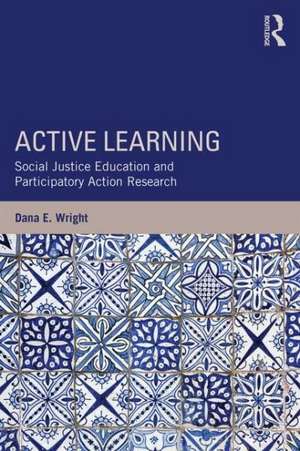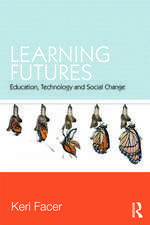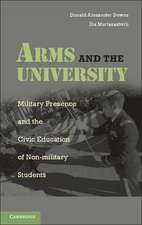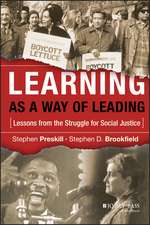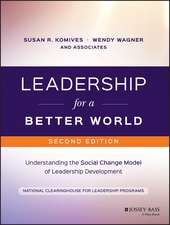Active Learning: Social Justice Education and Participatory Action Research: Teaching/Learning Social Justice
Autor Dana E. Wrighten Limba Engleză Paperback – 26 mar 2015
After an introduction to the history and demographics of the working-class West Coast neighborhood in which the described PAR project took place, the book discusses the "pedagogy of praxis" method and the project’s successful development of student voice, sociopolitical analysis capacities, leadership skills, empowerment and agency. Topics addressed include an analysis and discussion of the youth-driven PAR process, the reactions of student researchers, and the challenges for adults in maintaining youth and adult partnerships. A thought-provoking response to current educational challenges, Active Learning offers both timely implications for educational reform and recommendations to improve school policies and practices.
| Toate formatele și edițiile | Preț | Express |
|---|---|---|
| Paperback (1) | 450.03 lei 6-8 săpt. | |
| Taylor & Francis – 26 mar 2015 | 450.03 lei 6-8 săpt. | |
| Hardback (1) | 1000.76 lei 6-8 săpt. | |
| Taylor & Francis – 10 apr 2015 | 1000.76 lei 6-8 săpt. |
Preț: 450.03 lei
Nou
Puncte Express: 675
Preț estimativ în valută:
86.11€ • 89.91$ • 71.27£
86.11€ • 89.91$ • 71.27£
Carte tipărită la comandă
Livrare economică 04-18 aprilie
Preluare comenzi: 021 569.72.76
Specificații
ISBN-13: 9781138821712
ISBN-10: 1138821713
Pagini: 222
Ilustrații: 4 black & white tables
Dimensiuni: 152 x 229 x 15 mm
Greutate: 0.32 kg
Ediția:1
Editura: Taylor & Francis
Colecția Routledge
Seria Teaching/Learning Social Justice
Locul publicării:Oxford, United Kingdom
ISBN-10: 1138821713
Pagini: 222
Ilustrații: 4 black & white tables
Dimensiuni: 152 x 229 x 15 mm
Greutate: 0.32 kg
Ediția:1
Editura: Taylor & Francis
Colecția Routledge
Seria Teaching/Learning Social Justice
Locul publicării:Oxford, United Kingdom
Cuprins
Contents
Foreword
Chapter 1: Introduction
Overview of the Central Youth United Participatory Action Research Project
Researcher Location and Research Commitments
Research Methods and the Study Context
Overview of the Book
Organization of the Book
Chapter 2: Participatory Action Research (PAR) with Youth as Pedagogy
Introduction
What is Active Learning?
The Youth Discourses: Systems of Reasoning that Frame Young People
Adultism
The Role of Asset-based Pedagogies in Building Sociopolitical Consciousness
The Contexts of Schooling and Learning
What is Participatory Action Research with Youth?
PAR with Youth as a Teaching and Learning Approach
PAR as a Pedagogical Approach in the Central Youth United Project
Chapter 3: The Context of Central Youth United and Participant Profiles
Introduction
Profile of the Central Neighborhood
Background of the Central Youth United Project
Overview of the Central Youth United Project
Central Youth United Student Researcher Profiles
Jocelyn
Rashna
Alejandra
Terrence
Jason
Miguel
Eric
Victor
Chenda
Ameera
Profiles of Organizations Affiliated with the CYU Project
Central Community Development Center (CCDC)
Central Community Organizing Alliance
Representing Ourselves
Sister Space
Central Youth Task Force
Youth Voices
Chapter 4: A Pedagogy of Praxis: Connecting Reflection and Action
Introduction
Participatory Action Research as a Structured Teaching Approach
CYU’s Purpose and Goals and Motivations to Join the Project
A Community Building Curriculum to Promote Collaborative Inquiry
A Gradual Process to Bolster Marginalized Students’ Voice
A Pedagogy that Supports Youth Participation and Active Learning
Structured Activities to Elicit Youth Voice, Experiences and Perspectives
Teaching Strategies to Guide and Build Knowledge Producers
Conclusion: A Pedagogy of Praxis Approach
Chapter 5: Situated Learning: Change Agents in a Meaningful Purpose
Introduction
Youth Input and Decision-making: Contributing Ideas and Experiences
Relational Leadership: A Dialogical Process in Communities of Practice
Group Accountability within Relational Leadership
Inspiring Teamwork and Engagement in Others Through Relational Leadership
Peer Mentorship as a Component of Relational Leadership Development
Emergent Leadership Roles: Situated Learning
A Sense of Ownership
Adult Role in Increasing Project Ownership
Developing Agency, Commitment and Accountability
Features of Youth-led Work and Challenges
Challenges in Supporting a Youth-led Process
Conclusion: Situated Learning and Building Agency
Situated Learning
Connecting Ownership, Agency and Motivation through Communities of Practice
Positive Youth Development and Participation
Chapter 6: Promoting Sociopolitical Analysis Skills
Introduction
A Dialogic Approach that Taps Funds of Knowledge to Actively Construct Ideas
Developing Sociopolitical Analysis Skills
The Role of Vulnerability in Understanding Shared Challenges
Conclusion: Sociopolitical Analysis Development
Chapter 7: Empowering Youth as Experts and Knowledge Producers
Introduction
Successful Interventions by Instructors to Resolve Interpersonal Conflicts
Increasing Voice and Empowerment to Build Agency
Impact of the PAR Presentation and Next Steps
Discussion
Chapter 8: Tensions and Dilemmas in Sustaining Collaborative Work
Introduction
Catalyzing Events Impacting Group Dynamics
The Importance of Reflective Space In Group Processes
The Importance of Critical Care Approaches in Teaching Students of Color
Tensions in Partnerships between Student Researchers and Instructors
Impacts of Jason’s Disengagement on Group Dynamics
Lessons Learned about Instructors’ Roles and Interventions
Teaching Codes of Power to Navigate Environments
Sacrificing the Whole for One: The Need for Boundaries
The Construction of Four Context-Free "Bad Boys"
Discussion
Roles, Strategies and Approaches in Central Youth United
Design Issue: An Unfit Match?
Design and Planning Issue: A Lack of Support for Instructors
Design Issue: Bridging Two Youth Organizations
Design Issue: Connecting Macro- and Micro-level Violence
Conclusion: Implications for Youth and Adult Partnerships
Adults’ Support of Participatory Action Research Projects with Youth
Chapter 9: Conclusion
Summary of Key Points
A Pedagogy of Praxis
Significance of a Pedagogy of Praxis
Sociopolitical Analysis Development
Relational Leadership and Agency
Youth and Adult Partnerships: Power With
Dilemmas and Challenges the PAR Project Faced
Transferability of Study Findings
Recommendations for Teaching and Schools: PAR as Pedagogy
Recommendations for Practice: Participatory Action Research
Implications for Policy and Planning
Implications for Future Research
Discussion
References
Foreword
Chapter 1: Introduction
Overview of the Central Youth United Participatory Action Research Project
Researcher Location and Research Commitments
Research Methods and the Study Context
Overview of the Book
Organization of the Book
Chapter 2: Participatory Action Research (PAR) with Youth as Pedagogy
Introduction
What is Active Learning?
The Youth Discourses: Systems of Reasoning that Frame Young People
Adultism
The Role of Asset-based Pedagogies in Building Sociopolitical Consciousness
The Contexts of Schooling and Learning
What is Participatory Action Research with Youth?
PAR with Youth as a Teaching and Learning Approach
PAR as a Pedagogical Approach in the Central Youth United Project
Chapter 3: The Context of Central Youth United and Participant Profiles
Introduction
Profile of the Central Neighborhood
Background of the Central Youth United Project
Overview of the Central Youth United Project
Central Youth United Student Researcher Profiles
Jocelyn
Rashna
Alejandra
Terrence
Jason
Miguel
Eric
Victor
Chenda
Ameera
Profiles of Organizations Affiliated with the CYU Project
Central Community Development Center (CCDC)
Central Community Organizing Alliance
Representing Ourselves
Sister Space
Central Youth Task Force
Youth Voices
Chapter 4: A Pedagogy of Praxis: Connecting Reflection and Action
Introduction
Participatory Action Research as a Structured Teaching Approach
CYU’s Purpose and Goals and Motivations to Join the Project
A Community Building Curriculum to Promote Collaborative Inquiry
A Gradual Process to Bolster Marginalized Students’ Voice
A Pedagogy that Supports Youth Participation and Active Learning
Structured Activities to Elicit Youth Voice, Experiences and Perspectives
Teaching Strategies to Guide and Build Knowledge Producers
Conclusion: A Pedagogy of Praxis Approach
Chapter 5: Situated Learning: Change Agents in a Meaningful Purpose
Introduction
Youth Input and Decision-making: Contributing Ideas and Experiences
Relational Leadership: A Dialogical Process in Communities of Practice
Group Accountability within Relational Leadership
Inspiring Teamwork and Engagement in Others Through Relational Leadership
Peer Mentorship as a Component of Relational Leadership Development
Emergent Leadership Roles: Situated Learning
A Sense of Ownership
Adult Role in Increasing Project Ownership
Developing Agency, Commitment and Accountability
Features of Youth-led Work and Challenges
Challenges in Supporting a Youth-led Process
Conclusion: Situated Learning and Building Agency
Situated Learning
Connecting Ownership, Agency and Motivation through Communities of Practice
Positive Youth Development and Participation
Chapter 6: Promoting Sociopolitical Analysis Skills
Introduction
A Dialogic Approach that Taps Funds of Knowledge to Actively Construct Ideas
Developing Sociopolitical Analysis Skills
The Role of Vulnerability in Understanding Shared Challenges
Conclusion: Sociopolitical Analysis Development
Chapter 7: Empowering Youth as Experts and Knowledge Producers
Introduction
Successful Interventions by Instructors to Resolve Interpersonal Conflicts
Increasing Voice and Empowerment to Build Agency
Impact of the PAR Presentation and Next Steps
Discussion
Chapter 8: Tensions and Dilemmas in Sustaining Collaborative Work
Introduction
Catalyzing Events Impacting Group Dynamics
The Importance of Reflective Space In Group Processes
The Importance of Critical Care Approaches in Teaching Students of Color
Tensions in Partnerships between Student Researchers and Instructors
Impacts of Jason’s Disengagement on Group Dynamics
Lessons Learned about Instructors’ Roles and Interventions
Teaching Codes of Power to Navigate Environments
Sacrificing the Whole for One: The Need for Boundaries
The Construction of Four Context-Free "Bad Boys"
Discussion
Roles, Strategies and Approaches in Central Youth United
Design Issue: An Unfit Match?
Design and Planning Issue: A Lack of Support for Instructors
Design Issue: Bridging Two Youth Organizations
Design Issue: Connecting Macro- and Micro-level Violence
Conclusion: Implications for Youth and Adult Partnerships
Adults’ Support of Participatory Action Research Projects with Youth
Chapter 9: Conclusion
Summary of Key Points
A Pedagogy of Praxis
Significance of a Pedagogy of Praxis
Sociopolitical Analysis Development
Relational Leadership and Agency
Youth and Adult Partnerships: Power With
Dilemmas and Challenges the PAR Project Faced
Transferability of Study Findings
Recommendations for Teaching and Schools: PAR as Pedagogy
Recommendations for Practice: Participatory Action Research
Implications for Policy and Planning
Implications for Future Research
Discussion
References
Notă biografică
Dana E. Wright is an Assistant Professor of Education at Connecticut College.
Descriere
Active Learning presents an examination of innovative, interactive teaching strategies that were successful in engaging urban students who struggled with classroom learning.
